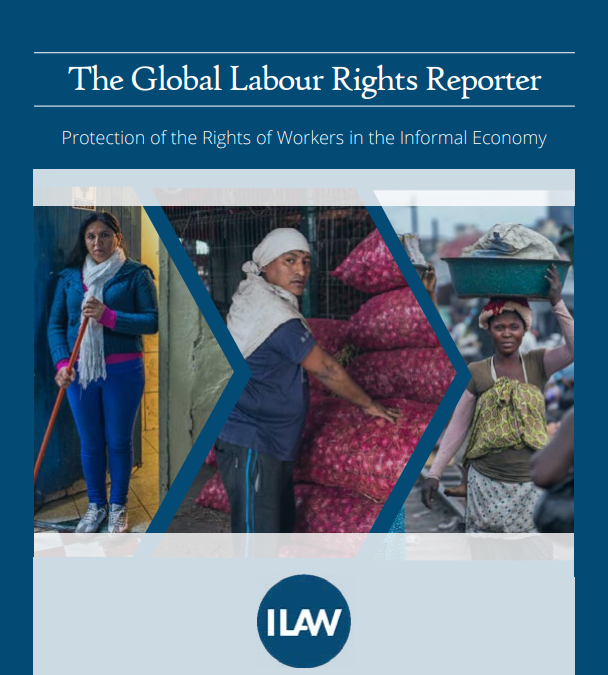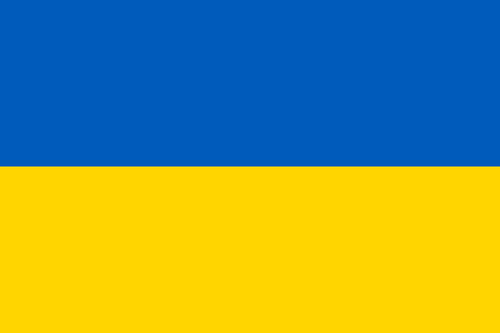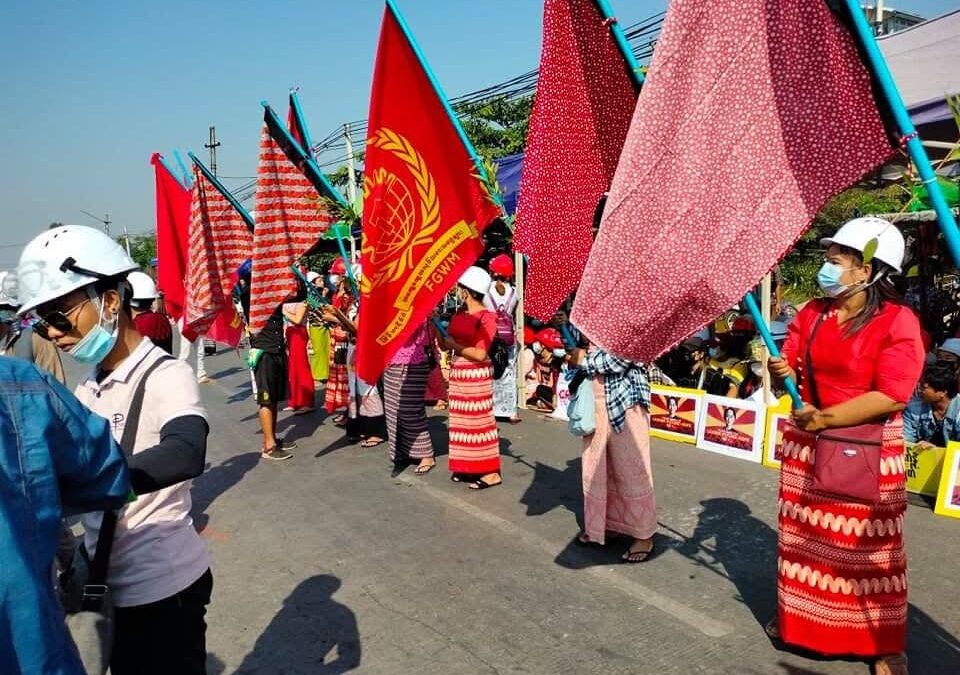
Mar 14, 2022
Workers in the informal economy, with assistance from legal advocates, have won protections and respect for their rights at work through a variety of legal strategies, both within and outside of labor law.
In the latest issue of the Global Labour Rights Reporter, case studies highlight the ways workers and their advocates have been fighting to ensure protections on the job in the informal sector, and the complications that arise from these efforts.
The journal, a project of the Solidarity Center’s International Lawyers Assisting Workers (ILAW) Network, is a forum for labor and employment law practitioners who grapple with the legal and practical issues that directly affect workers and their organizations. Articles feature migrant domestic workers in the Gulf, waste pickers in Colombia, digital platform workers in Brazil, agricultural workers in Jordan and street vendors and transport workers globally. There, unions and other worker representative organizations are developing laws and policies to ensure informal workers receive the same social protections that formal workers enjoy.
The International Labor Organization estimates that 61 percent of the world’s workers are in the informal economy—approximately 2 billion workers worldwide. They have been consistently excluded from legal recognition and protection, often due to deliberate policy choices driven by discrimination based on race, caste, sex, ability, age, migration status and more. The number of informal workers has only increased during the COVID-19 pandemic as businesses closed and governments fell short in creating policies that fostered formal job creation.
“[Is] labor law the only solution to informality? The answer is no, though this does not mean that labor law concepts cannot be helpful in shaping solutions,” according to Jeffrey Vogt, Solidarity Center’s director of rule of law and chair of the ILAW Network, and Marlese von Broembsen, law program director for Women in Informal Employment: Globalizing and Organizing (WIEGO), in the journal’s opening note. Advocating for coverage by labor law might be an effective strategy where workers in the informal economy are rendering a personal service for another. However, in cases where there is no notional employer, workers have adopted other strategies, including to negotiate agreements with municipal authorities to be afforded certain rights and/or be included in protection schemes, or engage in constitutional or human rights litigation.
Previous issues of the journal focused on access to labor justice and accountability and remedy in global supply chains. All issues are available in English, French and Spanish.

Mar 11, 2022
A number of Ukrainian trade unions, including the national union of nuclear plant workers, have donated portions of their salaries to Ukrainian aid and defense charities. In the first 10 days of the war, these trade union salary donations amounted to nearly $500,000.
One of the largest private-sector unions in Ukraine, the trade union of Nova Poshta (a shipping and logistics firm with operations also in Europe and the United States), conducted national and international fundraising to support its members displaced and in need, as well as the families of volunteers for Ukraine’s Territorial Defense Forces. In the first week of the war, the Nova Poshta trade union collected 795,000 hryvnia (about $27,000) for member assistance. In the first few days of outreach, 118 internally displaced people and refugees received aid, as did 45 families of members who were mobilized. The union expects this aid effort to grow quickly in the weeks ahead.
The Nova Poshta union, founded in 2015, signed its first collective bargaining agreement in 2016. Its pre-war membership was approximately 14,000 workers, and the collective agreement covers 27,000 employees.
The union’s work is in addition to that of the company, which is delivering humanitarian assistance from around the world to locations where it is needed most in Ukraine.
Although the Nova Poshta union is particularly active in solidarity support, many others are also assisting members during this crisis. These include fundraising and mutual aid efforts by the Union of Metal and Mining Workers, which has contributed over $35,000 to support families of mobilized soldiers.
Here’s How You Can Help
You can help Ukraine’s workers and their families by donating to the ITUC’s emergency fundraising appeal. The ITUC’s Ukrainian member organizations, FPU and KVPU, are providing support to families who desperately need assistance with food and water, medical supplies and hygiene items. Donate here.
You can also support these organizations also providing emergency assistance to people under bombardment or seeking refuge from the war:

Mar 4, 2022
Statement by the NED Family: The National Endowment for Democracy, the National Democratic Institute, the International Republican Institute, the Center for International Private Enterprise, and the Solidarity Center:
Vladimir Putin’s illegal and unjustified attack on a sovereign, free Ukraine is a watershed moment in the struggle for human freedom. To meet this moment, we are determined to support democracy activists on the frontline with the same sense of urgency they bring to their own national struggle. The National Endowment for Democracy (NED) and its four core partners—the National Democratic Institute (NDI), the International Republican Institute (IRI), the Center for International Private Enterprise (CIPE) and the Solidarity Center—stand in support and solidarity with our Ukrainian grantees, partners, staff, and their loved ones in Ukraine.
Since gaining independence in 1991, the people of Ukraine have time and again demonstrated their overwhelming desire to live in a free and democratic nation. We have been inspired as millions of Ukrainians have worked tirelessly and optimistically to build democratic institutions and practices in their country. Ukraine’s progress and commitment to this goal is what threatens and provokes Vladimir Putin. A democratic example on Russia’s border and a people with a shared culture and history who choose their own leaders, hold them accountable, and display a clear desire to join the community of democratic nations, represent an existential threat to Putin’s more than two-decade rule in Moscow and his ambition to dominate Russia’s neighbors.
Ukraine today is the epicenter of the fight for freedom in the world. The courage of the Ukrainian people—their willingness to risk everything to confront Russian aggression and defend their homeland—is an inspiration. They are a powerful example to all those worldwide who are joined in the struggle against authoritarian regimes that deprive free peoples of their basic rights and liberties, steal national wealth, attack and imprison political opponents, and silence independent media.
So too are the thousands of Russians and Belarusians who have risked arrest or worse to protest this criminal act of aggression. On Sunday, February 27, 2022, more than 10,000 people visited the memorial near the Kremlin marking the spot where Putin’s democratic rival, Boris Nemtsov, was assassinated seven years earlier. This is what Putin, and all dictators fear—ordinary citizens who would like to choose their leaders in free and fair elections and hold those leaders to account.
As the Ukrainian people struggle to preserve their sovereignty, their democracy, and their hopeful future, it is time for all those worldwide who live in freedom to rally to the cause of a free Ukraine.
Putin’s attack on Ukraine comes at a moment when democratic institutions are being systematically undermined across the globe and authoritarian regimes are growing in number and strength. Alert to a great danger, democratic societies should make every effort to secure the freedoms we cherish, the institutions we have built, and the values we have affirmed, to promote a more secure, just, and peaceful world.
Ukraine’s defense should become the valiant first chapter of a global democratic revival. In this task, we are committed to supporting a great coalition of courageous and creative political leaders, civic activists, independent journalists, labor organizers, entrepreneurs, and ordinary citizens who will lead the way.
MEDIA CONTACTS:
NED: Christine Bednarz, [email protected], (202) 200-6872
NDI: Victoria Benner, [email protected], (202) 728-5550
IRI: Ryan Mahoney, [email protected], (202) 914-1617
CIPE: Pam Kelley Lauder, [email protected], 202-721-9200
SOLIDARITY CENTER: Kate Conradt, [email protected]. 202-316-3301

Mar 9, 2021
Trade unions shuttered workplaces and brought thousands of people to the streets Monday in Myanmar, mobilizing a general strike as part of their continued resistance to the military takeover of the government on February 1.
In a statement calling for a nationwide strike on Sunday, the coalition of 18 unions said: “To continue economic and business activities as usual, and to delay a general work-stoppage, will only benefit the military as they repress the energy of the Myanmar people; The time to take action in defense of our democracy is now. The workers of Myanmar are prepared to take action to protect democracy and save our future generations from dictatorship. We believe all Myanmar people are prepared to respond to a call to action.”
In response to worker leadership in the civil disobedience movement (CDM), including other work stoppages, the military has declared at least 16 labor unions to be “illegal organizations” and has arrested or filed arrest orders for at least 71 individual union leaders, sources in the Myanmar labor movement tell the Solidarity Center. In 135 confirmed cases, workers have been fired for participating in street protests, while thousands more have had their factory jobs threatened if they participate further in the CDM.
The unions, mostly led by women, are on the front line with students and broader civil society calling for a return to democracy. For their leadership, they have had their union offices and homes and dormitories, where most garment workers live, raided and warrants for their arrest issued. Over the weekend, according to the Confederation of Trade Unions-Myanmar (CTUM), the military sought to arrest seven labor leaders, five women and two men: CTUM Women’s Committee President Swe Swe Khaing; AMG Garment Factory Union President Thet Mar Soe; Honor Garment Factory Union President, Sai Min Theta; Popular Garment Factory Union Secretary Treasurer Aye Thandar; Industrial Workers’ Federation of Myanmar union organizers San Sen and Myo Min Win; and Ei Ei Hlian, an executive committee member of Charming Garment Factory Union.
More than 60 people have been killed during the brutal crackdown on protesters and nearly 2,000 people have been arrested.
Since the political opening to quasi democracy in 2011, Myanmar has seen rapid growth in foreign direct investment. Major multinational brands source from factories there, with low-paid workers producing garments, footwear, sports equipment, cars and consumer goods. The country logged $4.5 billion in garment exports from October 2019 to July 2020.
Myanmar unions are urging countries and businesses to publicly condemn the coup; to exercise due diligence to ensure no business or investment is linked directly to or associated with the military; to announce that future international investments in the country would be reconsidered if democracy is not restored; ensure that no worker or union leaders are punished for going on strike or joining the current demonstrations against the coup; and to protect and respect freedom of association and the rights to assemble and peacefully protest.
The global labor movement has condemned the military coup, including the International Trade Union Confederation, AFL-CIO and IndustriALL, and called for the immediate restoration of democracy.

Jul 31, 2019
The Solidarity Center is deeply saddened by the death of our colleague and friend, Lyuba Frenkel, senior program officer for Europe and Central Asia, who succumbed July 30 after a brave battle with brain cancer.
Over Lyuba’s 26-year career with the Solidarity Center, she was instrumental in designing, supporting and monitoring projects that bolstered freedom of association throughout Eastern Europe, and for several years also in Southeast Asia. She built close cooperation with local partners, with a focus on collective bargaining, grievance representation, labor laws, trade union organizing, dispute resolution, migration and worker rights. Throughout her successful career, Lyuba never missed an opportunity to convince workers their lives can be better when they join in a union to fight for their interests together.
“A quiet person with a passion for the work, Lyuba helped thousands of workers understand and exercise their rights,” said Rudy Porter, Solidarity Center regional program director, Europe and Central Asia. “She will be deeply missed, both within the Solidarity Center and among the dozens of partner organizations around the globe with which she had such close ties.”
Lyuba was a tireless defender of those who suffered persecution because of their participation in independent unions, and almost daily sought new ways to push their cases to the forefront of public attention. And as a longtime advocate for women’s leadership to drive economic justice and social protection for all, Lyuba was an important catalyst for the Solidarity Center’s work today. She was especially involved in building union campaigns in Eastern Europe to end violence in the workplace.
“In her 26 years with the Solidarity Center, Lyuba stood firmly by people engaged in some of the world’s most consequential struggles for worker rights and human dignity. She did so with integrity and generosity, born of her deep commitment to justice. Lyuba was respected, liked and admired by everyone she worked with, and we will miss her,” said Shawna Bader-Blau, Solidarity Center executive director.
Lyuba is survived by her mother and daughter.
A graveside memorial service will take place at 1 p.m. Sunday, August 4, at the Garden of Remembrance Memorial Park, 14321 Comus Rd., Clarksburg, Maryland.





